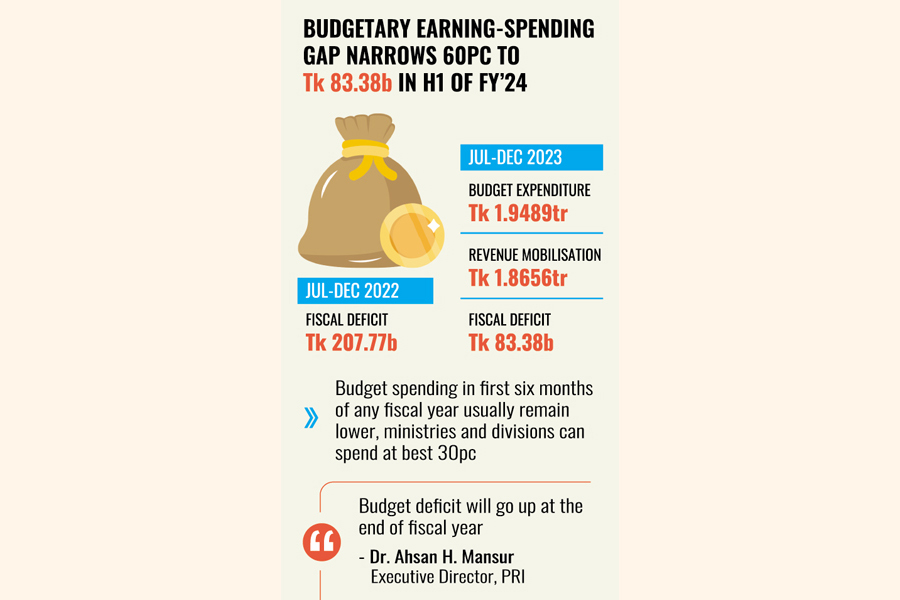
Published :
Updated :

Bangladesh sees some easing of budget stress with the fiscal deficit for the first half of 2023-24 narrowing nearly 60 per cent year on year to Tk 83.38 billion by official count.
According to the latest update on fiscal operations that the Ministry of Finance (MoF) released Wednesday, this deficit was Tk 207.77 billion during the same period a year before.
Total budget expenditure during July-December of this fiscal year was recorded at Tk 1.9489 trillion while the revenue mobilisation stood at Tk 1.8656 trillion, leaving a modest deficit.
The tax revenue was recorded at Tk 1.6216 trillion, up by 11.3 per cent over the same period a year earlier.
Spending from the annual development programme (ADP) outlay, which remained lower over past few years, also now increased 26.4 per cent to Tk 418.42 billion.
People familiar with the developments on the fiscal front at the MoF told the FE writer that the deficit remained lower as the revenue mobilisation was better than in previous period.
"Budget deficit is determined by either incorporating grants or disregarding them," says one finance official.
As of December 2023, in FY24, the overall balance (excluding grants) showed a negative figure, standing at 0.17 per cent of GDP. It was 0.46 per cent during the same period a year earlier.
However, in FY24, as of December 2023, a significant part of NBR tax revenue was generated from indirect taxes.
Of the total NBR taxes collected, 40.68 per cent came from VAT, 31.87 per cent from income tax, 14.21 per cent from supplementary duty, 11.93 per cent from import duty, with the remainder sourced from excise, export duty, and other taxes.
Interest payments for the period amounted to Tk 502.24 billion in a nearly 26-percent rise. The domestic interest payments accounted for Tk 423.14 billion while foreign at Tk 79.10 billion.
However, subsidies and incentives during the period were lowered by around 3.0 per cent to Tk 538.45 billion, the data show.
Contacted for their view of the financial situation, economists said the first six months of any fiscal year usually remain sluggish---the ministries and divisions can spend at best 30 per cent.
At the end of the fiscal year, the budget spending will go up and the deficit will also jump accordingly, they say about usual practice in Bangladesh of going great guns before the year closing.
Dr Ahsan H. Mansur, executive director of the Policy Research Institute or PRI, says, "The budget deficit will go up at the end of the fiscal year."
However, he has noticed some improvements in revenues during the period.
jasimharoon@yahoo.com


 For all latest news, follow The Financial Express Google News channel.
For all latest news, follow The Financial Express Google News channel.